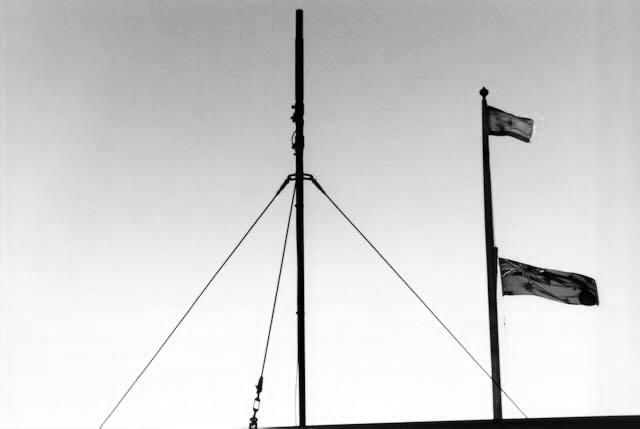The Uncanny Valley of Positional Power.
The ‘uncanny valley’ is a concept in robotics and artificial intelligence that describes the eerie or unsettling feeling people often experience when an artificial figure, such as a robot or an animated character, closely resembles a human being but is not quite convincingly lifelike. An artificial figure that becomes almost, but not perfectly, indistinguishable from a real human triggers unease or revulsion.
The more a person wielding positional power pretends to be approachable, friendly, down to earth, and ‘one of us’ - the more we feel repelled by them. The personal anecdotes make us cringe. The little jokes and attempts at humour fall flat. The speeches, emails, newsletters, and ‘management by walking around’ are disturbing.
How do we respond?
Forced to reciprocate in our own uncanny valley of forced smile small talk, ‘likes’ of their digital media posts, applause at their speeches, confected laughter at their humour.
And thus the source of unease and slow, quiet death in so many workplaces.
The Genius of a Good Law.
The genius of a good law is it distils a multitude of complex fields of human experience and learning, and signals what society values the most.
All the challenges, decisions, successes and failures; studies, calculations, observations, research, experimentation, psychology, ethics, virtues, and common good can be boiled down to a simple statement, or even a number.
How do we care for children?
We drive at 40km/h past a school during drop off and pick up times.
That Law attends to the Matter of efficient commerce in a safe Manner.
The Law signals ‘We prioritise our children above all else.’
When we drive at 40 - we signal we subordinate our needs to a greater good.
Let Me Sit With This.
Let me sit with this.
Let me take it in.
Let me understand it
From deep within.
- ‘A Time to Grow’, The Henry Girls
There are things that, when authentically said and heard - are like falling onto a soft bed.
‘Let me sit with this.’
When was the last time someone said that to you - or you said it to someone else?
Not - ‘Leave it with me.’
Not - ‘I’ll get back to you.’
Definitely not - ‘Let’s take that offline.’
And oh please not - ‘We’ll circle back to that later.’
Time spent is the ultimate compliment. ‘Let me sit with this,’ is a powerful statement of worthiness. Of servant-leadership. Of courtesy. Of respect. Of connection.
‘Let me sit with this,’ isn’t inaction or procrastination. It’s deep work.
‘Let me sit with this,’ is also part of the power of Step 1 - Step Back. We sit with our own emotions stirred up by a stimulus needing a decision. We take it in. We seek to understand why it is affecting us. We do this not as part of some box-ticking (even though ‘Five Steps’ does imply this).
We sit with our emotions and attend to our needs with the intent of understanding ourselves so we can be present with, understand, and serve another. Our mutual humanity beneath the corporate façade.
From deep within.
What Clichés Keep You Up at Night?
‘What keeps you up at night?’
Oh please.
The favourite ‘Gotcha!’ question of recruitment interviews, or boss to risk manager, or board to boss …
The person is meant to briefly stare into space, perhaps scratch their chin, then begin a list of catastrophes that sees them tossing and turning in their bed, labouring over the worries of the organisation and showing their commitment to it by losing sleep.
Like some badge of honour. ‘I lose sleep over this organisation.’
Really?
That’s what we want in our people? Sleep-deprived, worried, stressed, anxious workers, tossing and turning and pacing up and down in the darkness …?
Sure. It’s a metaphor. And so is the list of what it means to not sleep at night.
What does the question train our brain to think? First, our brain responds by picturing itself churning over quarterly profit and loss statements at 2am. Going over network configurations to confirm all the software patches are up to date against the latest threat to the company’s servers and information. Our brain can’t differentiate between the thought of something and the thing itself. Our brain says: Worry.
Like most stupid behaviour in organisations, the question is designed to meet the needs of the questioner (look at how I just cut to the chase!) rather than to genuinely elicit helpful information from a person.
Why not ask this question:
What helps you fall asleep at night?
The question does two things. First, it triggers our brain to think positively. To identify the good things that are being done, or need to be done. The actions that will put our mind at rest. A rested worker is a more productive worker.
Second, the framing of ‘What helps you fall asleep at night?’ shows the questioner cares.
Two Versions Down.
I’ve never released a product that I couldn’t see two or three versions down.
- Alex Lindsay, software developer
Each decision is that moment’s version of me.
Each decision is designed to draw me closer to my Widget.
Meaning - it’s a test release of the ideal version of me.
Meaning - people and Life will tell me its flaws - hopefully.
Meaning - I’m a step closer to two or three versions down of improved me.
Getting It Wrong.
The singer Melanie tried to imitate the singing style of Billie Holiday and Edith Piaf.
‘But I got it wrong and I became me,’ she said.
‘Getting it wrong’ helps lead us to become who we are.
Life's a Beach.
You lay your towel on the patch of beach sand.
Walk down to the water, wade in, then dive through the first sizeable wave.
You surface, slick your hair back (smoke ‘em if you’ve got ‘em), then brace yourself against the waves and current.
You look over your shoulder back to towards the beach.
Where’s your towel? Oh, there it is. To the right of that rainbow umbrella and lined up with the corner of the building in the distance.
You duck dive, do some backstroke, dog paddle, and try to catch a wave, as the current tugs at your body, taking you further down the beach.
Turn back to shore and shade your eyes. Where’s my towel? Umbrella. Building Corner.
Towel.
Widget.
The Anti-Widget Widget
Widget thinking demands that we focus on building, making, and creating a clearly defined Thing - the Widget.
This clarity of destination gives our journey - and those who share it - a reference point.
Yet the very essence and power of the Widget is why it is rejected by many.
'My life is about more than building a Widget. It's richer, deeper, softer, more nuanced, meaningful, unique, spiritual, complex...It can’t be reduced to a ‘widget’.’
Keep going…
Mirror for a Blind Spot.
A complainant allows you to outsource part of your thinking for free.
A complainant gives you access to an argument and reasons and even facts and evidence you may not otherwise consider.
A complainant is a camera on the dark side of the moon.
A mirror to your blind spot.
A complainant provides free consulting services to add value to your decision making.
If a person with skin in the game cannot give you better information than you already have - you can be even more confident in your decisions and actions.
The Stop Sign.
You routinely roll the stop sign thousands of times and life goes on.
The Police know drivers who rolled the stop sign and for whom life did not go on.
Which is right?
The stop sign.
Who Do You Want to Be?
Do you want to be a Lawyer, or someone who acts lawfully?
Do you want to be a Complainer, or someone who seeks explanations?
Do you want to be a Boss, or someone who serves others?
Do you want to be an Employee, or someone who does good work?
Do you want to be Popular, or someone who seeks to know yourself?
Do you want to be Right, or do you want to be happy?
The answer will set you free.
At the price of anxiety.
Good People.
Good people are not those who lack flaws, the brave are not those who feel no fear, and the generous are not those who never feel selfish. Extraordinary people are not extraordinary because they are invulnerable to unconscious biases. They are extraordinary because they choose to do something about it.
- Shankar Verdantam
Step Five of the Five Steps to a Good Decision is Check for Bias.
With No Respite.
Driving home after a demanding day.
At the red traffic light my mind turns to the soldiers.
Who did this day after week after month after year.
With no respite.
Other than wounding or death.
The Process is the Solution.
The greatest and most important problems of life are all in a certain sense insoluble…. They can never be solved, but only outgrown.
- Carl Jung
The process is the solution.
The time, attention, care, thought, then action - or not - are the solution to the insoluble problems.
Alone - or witnessed by another - the process is the outward sign of an inner growth.
The Deal.
An organisation’s major means of action, finally, can only be the manipulation of information or at least the strict regulation of access to information.
Michael Crozier, ‘The Bureaucratic Phenomenon’
We join an organisation for the same reason we hire a cab, cleaner, tradesperson, or watch the news or read a newspaper or a book.
We want someone else to go to the effort to decide what’s best for us.
We want someone else to curate the volume of information and choose what we need, and make it into a story.
We make a deal with the boss: you cut up my meat and mash my potatoes and feed me, and I won’t complain about the blandness of the processed food.
Don’t believe me?
Try working for yourself.
If You're a Boss.
If you’re a boss - immediately make it all about us - not you. Keep us informed, involved, engaged, supported, affirmed, responsible.
Don’t allow us any time to blame you for our unhappiness.
If we’re going to be miserable, best we realise early it’s not you - it’s me.
So we can seek our happiness elsewhere.
It's All Theatre.
The Parliamentary Undersecretary of State for Defence for the Royal Air Force Mr Geoffrey Pattie MP and the Air Member for Personnel Air Marshal Sir John Gingell visited RAF Linton-on-Ouse. Announcing their impending arrival of the VIPs, the public address declared: ‘All personnel are to be meticulous in the paying of compliments.’
The two visitors, escorted by the Group Captain Station Commander, joined the pilot trainees in their crew room.
‘You’ll never be closer to the horse’s mouth than you are this afternoon,’ the Station Commander tells his young pilot trainee subordinates, referring to the Member of Parliament responsible for their welfare. The room almost tilts with the massive power imbalance on opposite sides. The Commander invites questions from them.
‘One of the things that attracted me to the RAF was the prospect of six weeks annual leave,’ a young trainee bravely led off. ‘This last leave year, I only got two weeks.’
‘Everybody needs leave,’ the Undersecretary began, ‘And I’m a great believer in bigger and better holidays…’ And then … ‘BUT… ‘ and he hands over to the Air Marshal (AM) to answer the question.
‘We want everybody to have the maximum whack of leave that he can get in,‘ the AM begins. And then … ‘BUT … there will be periods when we can’t do our job if we have our maximum six weeks.’
The young Officer is not perturbed. He responds by pointing out that he’s not flying as well as a result of his lack of a break from training.
The AM says his fatigue is ‘all part of getting used to the intensity of operations. You grow out of the business of feeling tired after a while. You shouldn’t feel worried if you feel tired just at the moment.’
Another young trainee joins the fray. ‘Do you believe it’s fair to mislead people who are thinking of joining the Air Force ..?’
After the VIPs leave, the trainees review the experience over beers in the Mess. ‘We were being careful about what we said,’ they all agree.
The VIPs also gather to debrief. ‘I was a bit surprised,’ the Undersecretary says. ‘They seemed very much concerned with the day to day problems - leave came up and clothing came up.’
The Station Commander reminds them that the officers were told beforehand that ‘Nothing is taboo and let’s see what comes out. I thought they’d be asking how many seats would there be on [the then newly introduced] Tornados.’
Meanwhile, back in the Mess, one of the trainees says ‘You can’t afford to think about how many bombs your Tornado is going to carry.’ They all agree that their focus is on their next sortie and whether it will lead to a ‘chop ride’ and failure.
‘If he’d asked to come and see us why didn’t he ask us more questions?’ another young officer says to nods all around.
We’ve all been there. ‘Give us your feedback. ‘We value your opinion.’ ‘You are our most important asset.’ ‘There is no such thing as a dumb question.’ ‘We want to hear from you.’ These days its mostly in the form of online ‘anonymous’ surveys.
They pay our mortgage and expect us to tell the truth.
It’s all theatre.



















